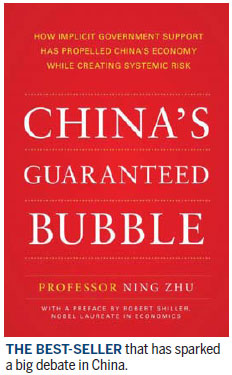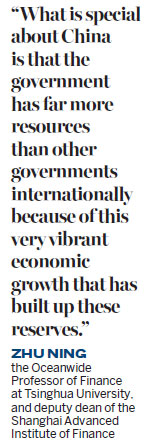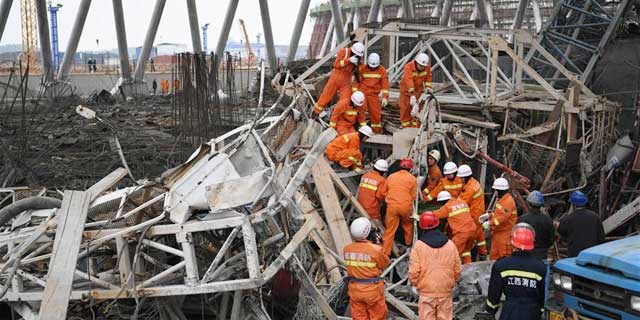Beware of the bubble
Expert says China's economy is in danger - but it does have a chance to pull back from the brink and avoid a meltdown
Zhu Ning believes there is a need for a faster pace of reform if China's debt problem is not going to lead to a major reversal for the economy.
The Oceanwide Professor of Finance at Tsinghua University is particularly concerned with the property market, with prices soaring 30 percent and more in tier-one cities like Beijing and Shanghai this year alone.
"I have met with people who claim concepts such as rental yields (which are at historic lows in China because of high property prices) do not apply in China because everyone in the country is trying to move and live in the big cities," he says.
|
Zhu Ning, professor of finance at Tsinghua University, is particularly concerned about the Chinese property market. Zou Hong / China Daily |
"The scariest moment of a bubble is when everyone believes there is no bubble."
Zhu, who is also deputy dean of the Shanghai Advanced Institute of Finance, spent much of the summer in the United States talking about his new book, China's Guaranteed Bubble, at the Brookings Institution in Washington as well as at the IMF and the World Bank.
"The book is getting quite a lot of interest and attention. I am often surprised about how little China is being understood, even sometimes among people who are supposed to be experts," he says.
Zhu, who was speaking at the Jamaica Blue Coffee Shop near Chaoyang Park, Beijing, says the central argument of his book - whose Chinese version is one of the top 50 best-selling economics books in China with 35,000 sales - is that Chinese investors behave as though there is no risk.
This, he argues, is because they believe whatever they invest in, whether it be trust products promising high returns, bonds or property, the risk is ultimately guaranteed by the Chinese government.
"We have had a few high profile defaults in the bond market this year in which the government has intervened. It sometimes creates situations where people jump into these default bonds after they have heard the news of default. The price has dived and they buy them because they know they will be bailed out."

The academic says the concept of government guarantee is not unique to China, but the way it works in practice is.
He argues that no other government in the world has the same firepower to sort out financial messes as they arise. China's foreign exchange reserves have increased from $200 billion (188 billion euros; 161 billion) in 2001 to $4.5 trillion in 2013.
"I think what is special about China is that the government has far more resources than other governments internationally because of this very vibrant economic growth that has built up these reserves."
Zhu says that, unlike last year when China's stock market crashed and there were fears over the yuan depreciating, the world's second-largest economy has been out of the spotlight this year so far.
The focus instead has been on the US presidential election, the possibility of the Federal Reserve Bank raising interest rates and European instability caused by the UK's Brexit decision.
He says the rapid rise in China's debt from 160 percent of GDP in 2005 to 247 percent in 2015, according to Bloomberg Intelligence, is alarming.
"At this speed China's total debt-to-GDP ratio will be soon approaching that of Japan, which currently has the world's highest," he says.
"It is always the speed and how fast things are changing that is important."
Zhu says this thinking is reinforced by influential Harvard economists Carmen Reinhart and Kenneth S Rogoff, authors of This Time is Different: Eight Centuries of Financial Folly.
"They point out that it is not the level of the ratio that is important in predicting a crisis. They say that many economies, especially developing ones, hit a crisis point when their debt-to-GDP ratio gets to only 70 or 80 percent but they have this pattern of fast acceleration instead."
The academic still believes the Chinese government has the ability to avert financial meltdown.
"I think we are at a crossroads where we can avert a crisis but if we don't do anything before the next plenary meeting of the Party in 2017 (19th National Congress of the Communist Party of China) this could be a problem. We could be losing another one and half years which could have been used to curb the debt ratio."
Zhu, a youthful 42 and who is from Beijing, graduated in international finance from Peking University in 1997.
He went on to earn a master's degree in management at Cornell before completing a doctorate in finance at Yale in 2003, where he specialized in the links between psychology and financial decision-making.
He went on to be assistant and then associate professor of finance at the University of California, Davis, for most of the last decade.
He moved to Hong Kong in 2008 to be head of quantitative strategy for Lehman Brothers and then head of portfolio advisory for Nomura Securities after the Japanese group took over the collapsed US bank.

He returned to the Chinese mainland in 2009 to become deputy director of the Shanghai Advanced Institute of Finance, and part of Shanghai Jiao Tong University. He took up the position at Tsinghua University in July.
His previous book, Investor's Enemy, which looked at some of the psychological aspects of investing, was well received by critics.
Zhu does not accept the notion that China has some added protection from a debt crisis because its debt is owed internally rather than externally, which was not the case for the Asian countries caught up in the financial crisis in the late 1990s.
"For foreign investors, it is just a matter of who loses and who makes money. If it is domestic, it is your own citizens losing money, which creates its own separate layers of risk," he says.
"People make the point that domestic debt is fine and use the case of Japan, where most of the debt is owed internally. Japan, however, is unique in many ways in that it made a lot of international investments overseas during its peak years in the 1980s. The reason domestic citizens can afford to keep buying Japanese government debt is that they have been raking in a lot of investment income from overseas."
Some have suggested that China might try to ease potential asset price bubbles like the housing market by devaluing its currency, which is what happened in Russia.
Although the value of Chinese property would fall in terms of other currencies, nominal yuan prices in China would remain the same.
Zhu does not believe this would be as easy to pull off for China as it was for Russia.
"China cannot effectively do this because it is not a fully open market, so you can't have the same calibrating force between the domestic and the international asset price."
Zhu says that what is essentially supporting house prices in China is its huge population, particularly in the tier-one cities.
He cites analysis by Gao Shanwen at securities firm Essence who argues there is a 70 percent correlation between the inflow of people of school age into a city and house price growth.
"There are about 12 to 14 cities in China that are like big suction cups, where there are people flowing in, such as Nanjing and Wuhan, as well as Beijing and Shanghai. The losers are the cities in northwestern and northeastern of China," he says.
Zhu says the Chinese government can still achieve a so-called soft landing for the economy but he believes a correction that slows growth might have long-term benefits also.
"It could be an opportunity to actually potentially transform the economy and enable it to build a more sustainable growth model," he says.
andrewmoody@chinadaily.com.cn
(China Daily European Weekly 11/25/2016 page8)



















